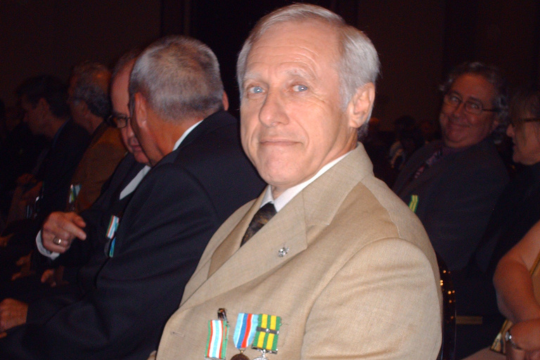
Helping take care of the community has been Régis Charron’s way of life since he was a child.
Trying to keep up with Régis Charron’s volunteering history is no easy task. It started early, ran parallel to his 32½-year career
with Correctional Service Canada, and showed, until recently, no sign of abating after his retirement.
Charron, who passed the baton as president of Québec’s Haute-Yamaska branch after 16 years last spring, sees his commitment to Federal Retirees as a way to show appreciation for the support he received from colleagues at the Cowansville Institution, a medium-security facility where he started working at age 21. Many of his former co-workers became members of the branch.
“It’s like paying it forward,” he says.
“People helped me a lot to integrate into that environment; the older ones were always there to advise us. So you give back to these people. That’s my personality.”
A native of Saguenay, Que., 200 kilometres north of Quebec City, Charron traces his volunteering roots back to his years at a boarding school run by the Marist Brothers, where he learned community work and picked up practical skills. Those came in handy when he moved back home to finish high school in a neighbourhood that offered no youth activities. With a group of friends, he set out to restore an abandoned ice rink and organize hockey teams. “That’s what we had done in boarding school: [we] set up rinks, prepared the ice, drew the lines,” he says. “We repeated what we’d learned, to take care of the younger kids.”
In 1973, Charron started working at the Cowansville, Que., facility, implementing a new correctional program that aimed to get to know detainees better and prepare them for a smooth re-entry into society. After several promotions, he switched focus to help manage day-to-day operations, a department that oversaw everything from IT to logistics.
Save for a four-year stint at La Macaza Institution, a facility in Quebec's Laurentian Mountains, Charron spent most of his career at Cowansville. During those years, he and his wife also devoted a lot of free time to volunteering at their three children’s activities — from coaching baseball and hockey to accompanying scouts on their trips.
A lifelong learner, Charron went back to school to seek a degree in social work and other qualifications. He also pushed for the local school board to certify the technical training of detainees at CORCAN, the agency that provides employment and employability skills to offenders.
Then, in the early 2000s, he made a life-changing decision, choosing to take part in a civilian mission to Haiti with the United Nations, as a technical adviser to Haiti's National Penitentiary.
“I would tour the penitentiary to see [that] there wasn’t too much violence, how detainees were treated,” he says. “About 95 per cent of inmates hadn’t had a trial.”
While the mission was cut short for security reasons, Charron went back to the country several times for the UN, including after his retirement in 2005. While he received medals from the UN and Canada for his work, what he experienced there was humbling.
“You can’t [believe] the misery you see there. It’s another planet,” he says. “People were always very nice to me. I learned more than I gave.”

